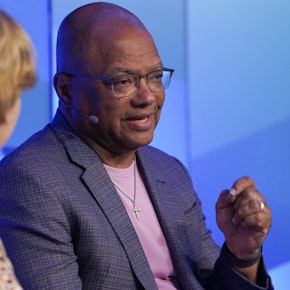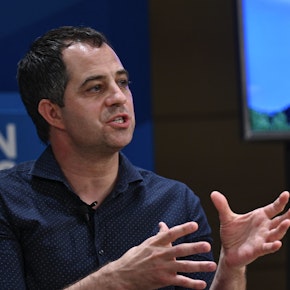Technology
Communication

Why do some conversations succeed while others stumble? The neurology and psychology of communication offer surprising explanations for why human connection goes right or wrong. Join in a live experiment — and explore how the right conversation, at the right moment, can change everything.

Americans’ trust in the media is near an all-time low — a crisis exacerbated by waves of misinformation, conspiracy theories, fake news, social media and AI-generated content. How can serious journalism restore trust and defend a world based on truth and facts?

From the measles vaccine to the origins of COVID, the speed at which disinformation spreads and the harms it can do have become painfully familiar. Communicators are fighting back, leveraging the same digital tools as myth purveyors—podcasts, TikTok, X, and other social media channels—to share scientific information in new ways, engage diverse audiences, combat falsehoods,...

Contemporary American society is deeply age segregated. Youth spend most of their time in school or with peers and older people head to senior centers and retirement communities. Yet a yearning for connections is palpable across the age spectrum and innovators are responding with models that bring the generations together in their homes, schools, workplaces, and communitie...

Mental health professionals consider sociopathy to be a personality disorder characterized by generalized apathy and difficulty internalizing and/or connecting to the learned social emotions. In her new book Sociopath: A Memoir, Patric Gagne freely admits the diagnosis applies to her, and attempts to help readers understand what it's like living with the complex personalit...

In this new Aspen Ideas format, all attendees gather each morning to kick off the day by exploring a current issue of deep complexity. The rapid growth of generative A.I. — surpassing expectations with over 100 million users of the technology in a short span of time — is a testament to its distinct intelligence and unique approach to problem-solving. There are many upsi...

While internet connectivity, technology, and digital skills are central to every part of modern life, the unfortunate reality is that millions of Americans have been left behind. We’ll discuss how transformational investment in digital equity and inclusion is helping close the digital divide.

A wise health consumer learns to be cautious when consulting Dr. Google, given the extent of the misleading or patently false information available online. But the internet is also an empowering source of rigorous, well-vetted knowledge, if you know where to look. Users need search engines, websites, and social media that offer ready access to trustworthy ideas and finding...

The older we get, the more we need our friends — but the harder it is to keep them. This is an aphorism in the best of times, but it’s tragically true after more than two years of pandemic. Jennifer Senior's story, "It's Your Friends Who Break Your Heart," published in The Atlantic last winter, touched a nerve and went viral. Are we seeing a fundamental shift in the nature...

Intelligence is more than the gray matter sloshing around in your skull, and more than the nerves that make sense of your environment. Your mind utilizes extra-neural resources, including the perceptions and knowledge in the minds of others — so the more people you surround yourself with, the bigger your brain is. In this session, we’ll dive into the research that shows ho...

COVID-19 vastly accelerated vaccine skepticism, such that even routine childhood immunizations, including shots that had largely eliminated measles, are now being questioned. Misinformation can be as contagious as disease, undermining faith in institutions, jeopardizing public health and safety, and distorting clinical decision making. Come watch a live demonstration that...

Kai-Fu Lee, a pioneer in the field of artificial intelligence, gives AI a B- for its performance during the pandemic. It’s far from perfect, he says, but gets a solid pass for its contributions to contact tracing and containment in China, where Lee lives and works. Importantly, he says, advances in artificial intelligence give us plenty of reasons to believe that the next...

This session considers the importance of trust, and a healthy distrust, in the well-being of a democracy and the role of the press in this equation drawing on the report of the Knight Commission on Trust, Media and Democracy released Feb. 5, 2019 titled, “Crisis in Democracy: Renewing Trust in America.” What measures should local journalism, social media, and the public ta...

Studies completed after the 2016 election show that media coverage of both Hillary Clinton and Donald Trump was overwhelmingly negative, extremely light on policy, and disproportionately focused on sideshows. What’s more, all of the major prediction models that use polls to game out election outcome probabilities predicted a Clinton victory. Could these entities, which are...

As humans, we have an inherent and intense desire for connection. Social media and our always-on devices have simultaneously fulfilled and thwarted this desire, so what comes next as artificially intelligent companions become even more integrated into our lives? In this interactive conversation, two tech journalists will explore and demonstrate the technology that wants to...

As consumers increasingly get their news online, and many news outlets shift from advertising-based business models to digital subscription-based business models, what role should tech platforms like Facebook play in supporting quality journalism? How do publishers tackle the challenges of breaking through various online channels to establish trust and relationships with r...

Every major social platform has to wrestle with its influence on society and how its leaders’ decisions affect people. But one site that hasn’t made many headlines is Reddit, a network of hundreds of thousands of communities for people to connect across shared interests, in politics, jokes, hobbies, life struggles, and countless other topics. From new content policies to p...

Bots — accounts with no human oversight — rule Twitter. According to a Pew Research analysis of more than 1.2 million public tweets, an astounding 66 percent of links tweeted are shared from bots. Enter accidental tech superheroes Ash Bhat and Rohan Phadte who, in the spring of their sophomore year at UC Berkeley, launched a counterattack called Botchek.me. Hear how two 20...

For our annual signature event in the Benedict Music Tent, the 2018 Aspen Ideas Festival hosts former secretary of state John Kerry in a candid conversation about geopolitics with Andrea Mitchell. Immediately afterward, in collaboration with Theatre Aspen, Ideas Festival presents a live performance by Broadway actors followed by panel discussions examining the historical a...

An opportunity to hear Axios Founder and Executive Editor Mike Allen discuss journalism and politics of the day with documentary filmmaker and journalist Perri Peltz.

